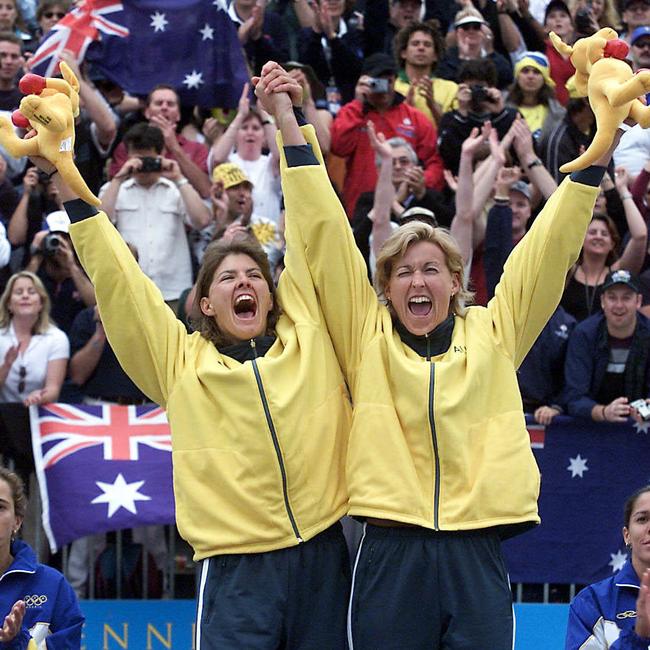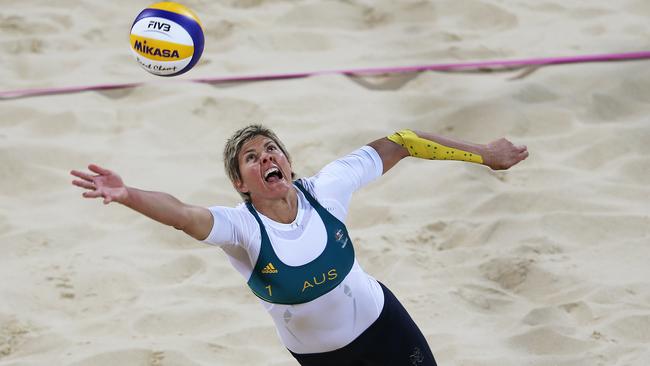Natalie Cook: the gold medallist with the $1m business plan for aspiring Olympic athletes
After ending up with a $300,000 debt following her stellar career, beach volleyball champion Natalie Cook is helping athletes help themselves to a better financial future.

Olympic gold medallist Natalie Cook calls it helping athletes build their own sustainable economy.
She has plans to raise $1m in a year, and hopefully one day more than $10m annually, to make her financial dreams come true for future Olympians.
As the 2024 Paris Games near, the financial reality of what it costs for athletes to try to make an Olympic team starts to bite.
After the glory of competing at the Games subsides, there are still bills left to pay as thoughts turn to whether it’s worth the sheer cost of slogging through another four years for athletes to try to represent their country at another Olympics.
Cook herself encapsulates that issue.
She won a beach volleyball gold medal for Australia at the 2000 Sydney Olympics and made five Olympic squads in a glittering career that also included a bronze medal in 1996 – but she also ended up with a $300,000 debt at the end and was supported by her father remortgaging his house during it

Which is why Cook, who works one day a week at professional services giant Deloitte and is on the board of the Brisbane 2032 Olympics, has taken matters into her own hands to try to instil some business nous in up-and-coming athletes.
Cook has formed the Aussie Athletes Fund, which aims to raise $1m for 100 aspiring Olympic athletes annually. The athletes are matched with a business supporter who helps them raise $10,000 each.
Ampol has been signed as an initial backer, and in the space of a few months Cook has already matched 60 athletes with a business backer, and helps mentor and prepare the athletes for meetings and suggests various fundraising initiatives and ideas.
“I basically don’t want athletes to go through what I did. But I always want to teach them the skills that are necessary to raise money and to deal with potential sponsors,” Cook says.
“It is hard, but they have to be prepared to ask people for support, they need to learn how to handle rejection and keep on going. But even $10,000 can make a lot of difference to an athlete.”
There are milestone funding awards for the athletes along the way, and other incentives designed to make the program appeal to their competitive nature, and all funds raised go through the tax-deductible Australian Sports Foundation fundraising and charity body.

Cook says she is only getting started with her program, and has her own goal of making that $1m annual target double in a year or two, and then hopefully be as much as $1m a month by the time Brisbane 2032 comes around.
Making ends meet is an increasing concern for Olympians, especially with cashed-up professional sports and leagues such as cricket and the AFL being able to offer young – and especially female – athletes higher wages than do Olympic sports.
Cook says she broadly welcomes the federal government’s recent announcement of $283m in funding for Olympic sports for the next two years.
That includes an increase of $17.6m to the Direct Athlete Investment Support Grants (dAIS) program, adding to the $14.03m being paid directly to athletes each year by the government under previous arrangements.
There are also various state government grants, incentives and payments for Olympians who win medals at the Games or world championships in between, and some funding from the Australian Olympic Committee and billionaires such as Gina Rinehart.
But Cook points out that the dAIS funding usually adds up to only about $35,000 a year at the most for athletes, who typically have to fit their elite-level training around work and study commitments and deal with increasing costs.
“People don’t think of the equipment that athletes have to get or use, for example,” she says. “So I tell the athletes you can ask for money, but you can also ask for equipment as well. And that doesn’t mean just an endless supply of water bottles that everyone hands out; it is about getting what they need for free. It all helps.”






To join the conversation, please log in. Don't have an account? Register
Join the conversation, you are commenting as Logout